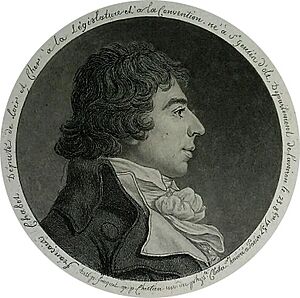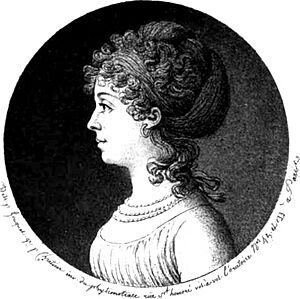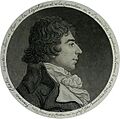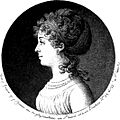François Chabot facts for kids
François Chabot (born October 23, 1756 – died April 5, 1794) was an important French politician during the French Revolution. He was known for his strong beliefs and his role in the government during a very turbulent time in France's history.
Contents
Early Life and Beginnings in Politics
François Chabot was born in a town called Saint-Geniez-d'Olt in France. Before the French Revolution, he became a Capuchin religious brother. He was very interested in the ideas of philosophes, who were thinkers who wrote about new ways of looking at society and government.
Later, Chabot left his religious life. He got married and continued to be involved in the church as a "constitutional priest." This meant he followed the new rules for the church set by the revolutionary government. He also helped start the Jacobin Club in Rodez, a powerful political group.
Chabot was then chosen to be a member of the Legislative Assembly. This was a group of lawmakers who made decisions for France. He was part of the "far left," meaning he wanted big and quick changes in the government. He worked closely with two other politicians, Claude Bazire and Antoine Christophe Merlin, and they were sometimes called the "Cordelier Trio."
Working in the National Convention
Chabot was later elected to another important group called the National Convention. Here, he made a very serious decision. He voted for the execution of King Louis XVI. This was a major event in the French Revolution.
In March 1793, Chabot became a "Representative-on-mission." This meant he was sent to different parts of France to make sure the local governments were following the new revolutionary rules. He went to the regions of Aveyron and Tarn.
Changes in the Regions
Chabot and another representative, Jean-Baptiste Bô, quickly started making changes. They created a special group to help recruit people for the army. They also put a new tax on wealthy people to help pay for the war.
To stop local protests, Chabot and Bô temporarily stopped the democratic system. They could remove officials who they felt were not supportive enough of the revolution. They also made it easier for the government to search and take things. Chabot was known for being very active in making these changes.
Challenges and Accusations
In November 1793, some members of the Convention accused François Chabot of wrongdoing. They claimed he tried to trick the financial system of the French East India Company. They said he offered bribes to other politicians.
Chabot told Maximilien Robespierre, a powerful leader, that he was actually trying to uncover a plot. He claimed a royalist, the Baron de Batz, was behind a plan to mess with the company's money. Chabot said others, including Jacques-René Hébert and Claude Basire, were involved.
However, there was little proof for Chabot's claims. Instead, people focused on his marriage to Leopoldine Frey. She was the sister of an Austrian banker. The fact that she was from Austria and that Chabot received a large dowry (money given at marriage) made people suspicious of him.
One politician, Dufourny, spoke against Chabot. He pointed out that Chabot married an "Autrichienne" (Austrian woman) at a time when France was very angry at foreigners. This made Chabot's story seem less believable to many.
Arrest and Execution
Because of the accusations about the French East India Company and the claims of bribery, Chabot was arrested. He was put on trial before the Revolutionary Tribunal, a special court.
Chabot was found guilty and sentenced to death. He was guillotined on April 5, 1794. He was executed at the same time as a group of politicians known as the Dantonists. These Dantonists were upset to be associated with Chabot, calling him a "fripon" (a scoundrel or rascal).
Claude Basire and Fabre d'Eglantine, who Chabot had accused, were also executed. Chabot's brother-in-law, Junius Frey, was also executed with him.
Quotes
- "Christ was the first 'sans-culotte'." (A "sans-culotte" was a common person who supported the revolution.)
- "What is my law, you ask? I answer: the natural law, the one saying: Poor people, seek the rich; girls, seek the boys. Follow your instincts."
Images for kids
 | Sharif Bey |
 | Hale Woodruff |
 | Richmond Barthé |
 | Purvis Young |





